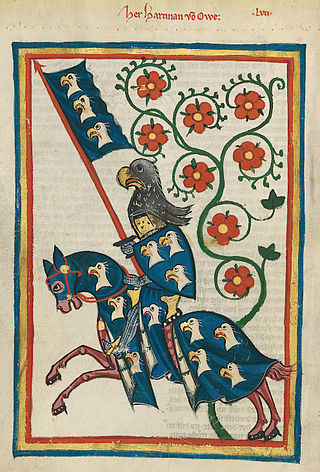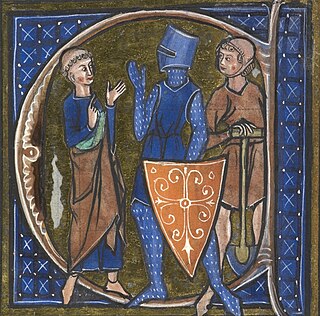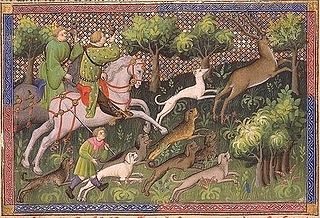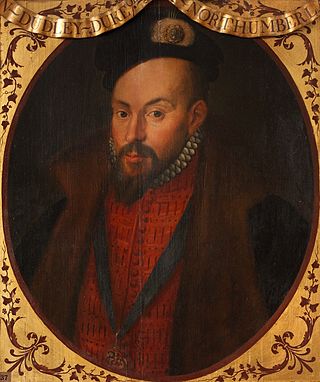
A knight is a person granted an honorary title of knighthood by a head of state or representative for service to the monarch, the church or the country, especially in a military capacity. Knighthood finds origins in the ancient Greek hippeis (ἱππεῖς) and Roman equites.

Yeoman is a noun originally referring either to one who owns and cultivates land or to the middle ranks of servants in an English royal or noble household. The term was first documented in mid-14th-century England. The 14th century also witnessed the rise of the yeoman longbow archers during the Hundred Years' War, and the yeoman outlaws celebrated in the Robin Hood ballads. Yeomen also joined the English Navy during the Hundred Years' War as seamen and archers. In the early 15th century, yeoman was the rank of chivalry between page and squire. By the late 17th century, yeoman became a rank in the Royal Navy for the common seamen who were in charge of ship's stores, such as foodstuffs, gunpowder, and sails.
Lord is an appellation for a person or deity who has authority, control, or power over others, acting as a master, chief, or ruler. The appellation can also denote certain persons who hold a title of the peerage in the United Kingdom, or are entitled to courtesy titles. The collective "Lords" can refer to a group or body of peers.

Baron is a rank of nobility or title of honour, often hereditary, in various European countries, either current or historical. The female equivalent is baroness. Typically, the title denotes an aristocrat who ranks higher than a lord or knight, but lower than a viscount or count. Often, barons hold their fief – their lands and income – directly from the monarch. Barons are less often the vassals of other nobles. In many kingdoms, they were entitled to wear a smaller form of a crown called a coronet.

A gentleman is any man of good and courteous conduct. Originally, gentleman was the lowest rank of the landed gentry of England, ranking below an esquire and above a yeoman; by definition, the rank of gentleman comprised the younger sons of the younger sons of peers, and the younger sons of a baronet, a knight, and an esquire, in perpetual succession. As such, the connotation of the term gentleman captures the common denominator of gentility ; a right shared by the peerage and the gentry, the constituent classes of the British nobility.

Esquire is usually a courtesy title.
Lady is a term for a girl or woman, with various connotations. Once used to describe only women of a high social class or status, the female counterpart of lord, now it may refer to any adult woman, as gentleman can be used for men. Informal use is sometimes euphemistic.

Lord of the manor is a title that, in Anglo-Saxon England and Norman England, referred to the landholder of a rural estate. The titles date to the English feudal system. The lord enjoyed manorial rights as well as seignory, the right to grant or draw benefit from the estate. The title continues in modern England and Wales as a legally recognised form of property that can be held independently of its historical rights. It may belong entirely to one person or be a moiety shared with other people.

In the Middle Ages, a squire was the shield- or armour-bearer of a knight.

In heraldry, an escutcheon is a shield that forms the main or focal element in an achievement of arms. The word can be used in two related senses. In the first sense, an escutcheon is the shield upon which a coat of arms is displayed. In the second sense, an escutcheon can itself be a charge within a coat of arms.

The landed gentry, or the gentry, is a largely historical British social class of landowners who could live entirely from rental income, or at least had a country estate. While distinct from, and socially below, the British peerage, their economic base in land was often similar, and some of the landed gentry were wealthier than some peers. Many gentry were close relatives of peers, and it was not uncommon for gentry to marry into peerage. It is the British element of the wider European class of gentry. With or without noble title, owning rural land estates often brought with it the legal rights of lord of the manor, and the less formal name or title of squire, in Scotland laird.
Knight of the shire was the formal title for a member of parliament (MP) representing a county constituency in the British House of Commons, from its origins in the medieval Parliament of England until the Redistribution of Seats Act 1885 ended the practice of each county forming a single constituency. The corresponding titles for other MPs were burgess in a borough constituency and baron for a Cinque Ports constituency. Knights of the shire had more prestige than burgesses, and sitting burgesses often stood for election for the shire in the hope of increasing their standing in Parliament.

Dower is a provision accorded traditionally by a husband or his family, to a wife for her support should she become widowed. It was settled on the bride by agreement at the time of the wedding, or as provided by law.

A Gest of Robyn Hode is one of the earliest surviving texts of the Robin Hood tales. Written in late Middle English poetic verse, it is an early example of an English language ballad, in which the verses are grouped in quatrains with an ABCB rhyme scheme, also known as ballad stanzas. Gest, which means tale or adventure, is a compilation of various Robin Hood tales, arranged as a sequence of adventures involving the yeoman outlaws Robin Hood and Little John, the poor knight Sir Richard at the Lee, the greedy abbot of St Mary's Abbey, the villainous Sheriff of Nottingham, and King Edward of England. The work survives in printed editions from the early 16th century, just some 30 years after the first printing press was brought to England. Its popularity is proven by the fact that portions of more than ten 16th- and 17th-century printed editions have been preserved. While the oldest surviving copies are from the early 16th century, many scholars believe that based on the style of writing, the work likely dates to the 15th century, perhaps even as early as 1400. The story itself is set somewhere from 1272 to 1483, during the reign of a King Edward; this contrasts with later works, which generally placed Robin Hood earlier in 1189–1216, during the reigns of Richard I of England and John, King of England.
The British nobility is made up of the peerage and the (landed) gentry. The nobility of its four constituent home nations has played a major role in shaping the history of the country, although the hereditary peerage now retain only the rights to stand for election to the House of Lords, dining rights there, position in the formal order of precedence, the right to certain titles, and the right to an audience with the monarch. More than a third of British land is in the hands of aristocrats and traditional landed gentry.
The social structure of the United Kingdom has historically been highly influenced by the concept of social class, which continues to affect British society today. British society, like its European neighbours and most societies in world history, was traditionally divided hierarchically within a system that involved the hereditary transmission of occupation, social status and political influence. Since the advent of industrialisation, this system has been in a constant state of revision, and new factors other than birth are now a greater part of creating identity in Britain.

In the Kingdom of England from the 12th to 15th centuries, a franklin was a member of a certain social class or rank. In the Middle English period, a franklin was simply a freeman; that is, a man who was not a serf. In the feudal system under which people were tied to land which they did not own, serfs were in bondage to a member of the nobility who owned that land. The surname "Fry", derived from the Old English "frig", indicates a similar social origin.

Gentry are "well-born, genteel and well-bred people" of high social class, especially in the past. Gentry, in its widest connotation, refers to people of good social position connected to landed estates, upper levels of the clergy, or "gentle" families of long descent who in some cases never obtained the official right to bear a coat of arms. The gentry largely consisted of landowners who could live entirely from rental income or at least had a country estate; some were gentleman farmers. In the United Kingdom, the term gentry refers to the landed gentry: the majority of the land-owning social class who typically had a coat of arms but did not have a peerage. The adjective "patrician" describes in comparison other analogous traditional social elite strata based in cities, such as the free cities of Italy and the free imperial cities of Germany, Switzerland, and the Hanseatic League.

Rache, also spelled racch, rach, and ratch, from Old English ræcc, linked to Old Norse rakkí, is an obsolete name for a type of hunting dog used in Great Britain in the Middle Ages. It was a scenthound used in a pack to run down and kill game, or bring it to bay. The word appears before the Norman Conquest. It was sometimes confused with 'brache', which is a French derived word for a female scenthound.

An Esquire of the Body was a personal attendant and courtier to the Kings of England during the Late Middle Ages and the early modern period. The Knight of the Body was a related position, apparently sometimes merely an "Esquire" who had been knighted, as many were. The distinction between the two roles is not entirely clear, and probably shifted over time. The positions also existed in some lesser courts, such as that of the Prince of Wales.













